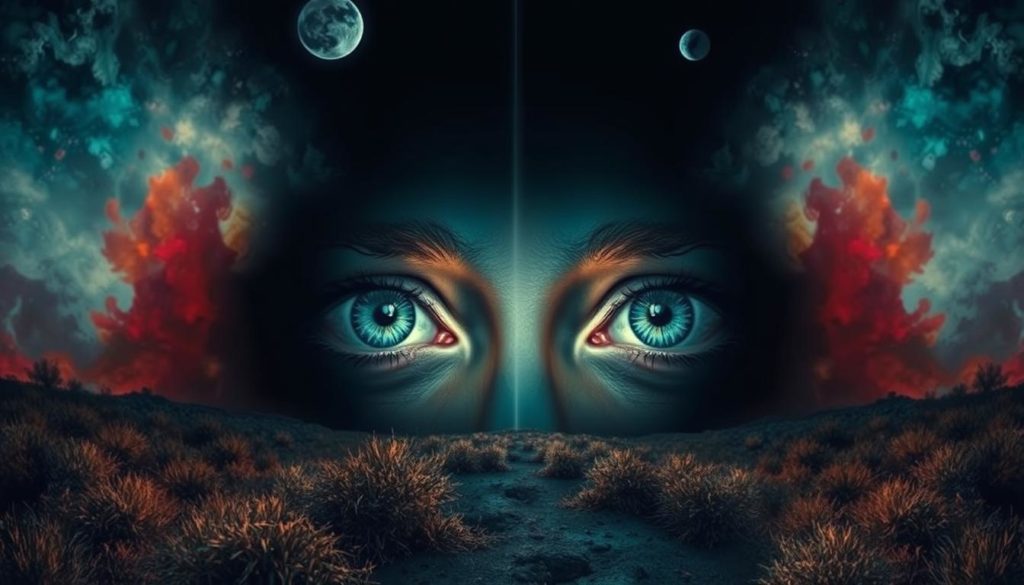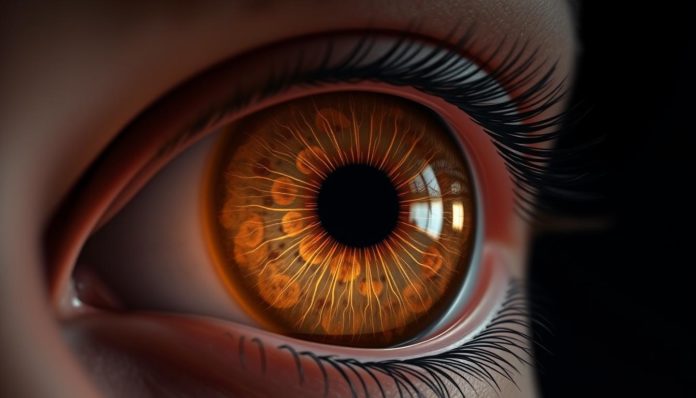Did you know that about 32 million Americans face night vision issues? This fact from the National Eye Institute (NEI) shows how common low light vision problems are. Whether it’s driving at night or navigating a dark room, these issues can really affect our daily lives.
Many factors can make it hard for our eyes to adjust to dark. In this article, we’ll look at the main reasons for night vision problems. We’ll cover health issues, environmental factors, and lifestyle choices. Knowing these can help you tackle these problems.
Keep reading as we examine each cause. We’ll use insights from Harvard Health Publishing and the American Optometric Association. This guide is for anyone looking to understand night vision problems better.
Common Causes of Night Vision Problems
It’s important to know why night vision can be a problem. Many things can cause it, from simple eye issues to serious eye diseases.

Uncorrected vision problems like myopia or astigmatism are big culprits. They mess up how light hits your retina, making it hard to see at night. Getting your eyes checked and wearing the right glasses can help a lot.
Cataracts are another big reason for bad night vision. They cloud the lens of your eye, blocking light. Surgery can fix this issue.
Eye diseases like retinitis pigmentosa and macular degeneration also cause night vision problems. They damage the retina, which is key for seeing in the dark. Seeing a doctor early and following their advice is crucial.
| Condition | Impact on Night Vision | Potential Solutions |
|---|---|---|
| Refractive Errors | Blurry vision | Corrective lenses |
| Cataracts | Clouded vision | Surgery |
| Retinal Conditions | Impaired signal conversion | Medical treatment |
Learning about these causes of night vision problems helps you understand your vision issues. It also guides you on how to fix them.
Health Conditions Impacting Night Vision
Learning about the causes of bad night vision can help you manage it better. Many health issues can affect how well you see at night. We’ll look at three main ones: diabetes, glaucoma, and vitamin deficiencies.
Diabetes and Night Vision
Diabetes can change blood sugar levels, which affects the eye’s lens. High glucose can cause diabetic retinopathy. This damages the retina’s blood vessels, making night vision worse.
The American Diabetes Association says keeping blood sugar stable is key. People with diabetes often struggle with driving or doing things in the dark.

Glaucoma
Glaucoma is another big reason for bad night vision. It damages the optic nerve due to high eye pressure. The Glaucoma Research Foundation says it can make seeing in the dark hard.
As glaucoma gets worse, you lose your side vision. It’s important to get it treated to keep your night vision.
Vitamin Deficiencies
Vitamin A deficiency is a major issue for night vision. Vitamin A helps make rhodopsin, a key pigment for seeing in the dark. Without enough Vitamin A, night vision gets worse.
The National Institutes of Health suggest eating enough Vitamin A or taking supplements. This helps keep your eyes healthy.
Here’s a table showing how these health issues affect night vision:
| Health Condition | Impact on Night Vision | Management Strategies |
|---|---|---|
| Diabetes | Blood vessels in the retina are damaged, causing blurred vision in low light. | Maintain blood sugar levels and regular eye check-ups. |
| Glaucoma | Loss of peripheral vision, impairing one’s ability to see in dimly lit environments. | Regular intraocular pressure monitoring and appropriate treatment. |
| Vitamin A Deficiency | Low rhodopsin production, leading to night blindness. | Ensure adequate vitamin intake through diet or supplements. |
Role of Aging in Nighttime Vision Difficulties
As we get older, our eyes change. This is a natural part of aging. It can make it harder to see well at night. These changes are due to aging and certain eye conditions.
Natural Degeneration
One big reason for night vision problems in older people is natural degeneration. The eye’s structure and how it works change over time. For example, the lens loses its flexibility, making it tough to focus on things close and far away.
This is called presbyopia. Also, the pupil gets smaller and doesn’t react as well to low light. This makes seeing at night even harder.
Impact on the Eyes
Eye diseases that come with age also affect night vision. Conditions like macular degeneration and cataracts are common. Macular degeneration makes the central part of the retina less clear, causing blurry or dark vision.
Cataracts cloud the lens, making it hard to see in low light. These problems make night driving, reading, and other activities hard.
Also, the number of rod cells in the retina decreases with age. Rod cells help us see in the dark. With fewer of them, seeing at night becomes even more difficult.
Environmental and Lifestyle Factors
Our lifestyle and environment can greatly affect our vision at night. Many factors lead to nighttime vision problems. It’s important to know how these factors impact our sight.
Poor lighting is a big reason for night vision issues. Not enough street lights or dim indoor lights can hurt our eyes. Bright lights before going into the dark can also cause temporary blindness.
But it’s not just about light. Pollution in cities, like smog, can also hurt our night vision. These pollutants scatter light, making it hard to see and causing eye discomfort.
Our lifestyle choices also matter a lot. Smoking can harm our eyes by reducing blood flow to the retina. This makes it harder to see in the dark. Drinking alcohol can also mess with our vision, making it blurry and slow to react at night.
By understanding these factors and making changes, we can improve our night vision. Adjusting lights, avoiding pollution, and cutting down on smoking and drinking can help a lot. Small steps can make a big difference in how well we see at night.
Here’s a look at how lifestyle choices affect night vision:
| Factor | Impact on Night Vision |
|---|---|
| Poor Lighting Conditions | Increases strain, reduces visual acuity |
| Bright Light Exposure | Causes temporary blindness |
| Urban Pollution | Scatters light, causes visual discomfort |
| Smoking | Reduces blood flow to retinal cells |
| Alcohol Consumption | Impairs visual processing, delays reactions |
Effects of Eye Strain on Night Vision
It’s important to know how eye strain affects night vision, especially today. Looking at screens for too long can harm our eyes. This affects how well we see in the dark.
Computer and Device Use
Spending hours on screens is common now. But, it’s bad for our eyes. Computers and phones give off blue light, which makes eye strain worse. The American Academy of Ophthalmology says taking breaks and using screen filters can help.
Lack of Rest
Getting enough sleep is key for eye health. Without enough rest, our eyes get tired. This makes it harder to see in the dark.
The Sleep Foundation says sleep is crucial. It helps reduce eye strain and improves night vision. Regular sleep helps our eyes recover from daily stress.
Genetic Factors and Heredity
Genetic factors greatly affect our vision, especially in low light. Conditions like retinitis pigmentosa can make it hard to see at night. Knowing the genetic causes can help find ways to prevent and treat these issues.
Figuring out if night vision problems run in families is key. Resources like the Genetics Home Reference and the Foundation Fighting Blindness offer help and info.
Here’s a look at how genetic conditions like retinitis pigmentosa compare to other night vision problems:
| Condition | Cause | Impact on Night Vision | Treatment Options |
|---|---|---|---|
| Retinitis Pigmentosa | Genetic Factors | Severe impairment in low light | No cure, preventive interventions |
| Diabetic Retinopathy | Diabetes | Gradual night vision loss | Blood sugar management, laser treatments |
| Vitamin A Deficiency | Lack of Vitamin A | Difficulty seeing in dim light | Vitamin A supplementation |
Understanding genetic factors in vision can improve eye health. It helps manage and prevent problems linked to genetics.
Medications and Their Impact
Some medicines can really mess with your night vision, making everyday tasks hard. It’s key for both patients and doctors to know how these drugs work.
Common Drugs
Many drugs we take can mess with our night vision. Here are a few examples:
- Beta-blockers: These are for high blood pressure but can make night vision worse.
- Antidepressants: Some, like SSRIs, might make it harder to see at night.
- Antihistamines: These allergy meds can cause blurry vision or trouble seeing in the dark.
Side Effects
How a drug affects your night vision can vary. Some common issues include:
- Photophobia: This means you’re more sensitive to light, making it tough to see in the dark.
- Blurriness: This can make it hard to see clearly at night.
- Reduced Contrast Sensitivity: It’s hard to tell objects from their background in dim light.
Talking to your doctor about vision problems caused by meds is important. It can help avoid accidents and make life better.
Understanding Low Light Vision Issues
Having trouble seeing in low light can really affect our daily lives. It makes things like driving at night or walking in dim places hard. The main reason is how light levels affect our eyes.
When it gets darker, our eyes work harder to see clearly. This can lead to blurry or poor vision.
Some people find it harder to get used to the dark than others. This is because of their retina health and how well their rod cells work. Rod cells help us see in low light.
Experts at VisionAware say people with less rod cell function have trouble moving from bright to dark areas.
Getting a dilated eye exam is key to figuring out why we have trouble seeing at night. Ophthalmologists do these exams to find out what’s causing the problem. The National Institute on Aging says these exams can spot age-related vision changes that make it hard to see at night.
The International Dark-Sky Association also talks about how artificial light pollution affects our night vision. They stress the need to make our environments better for our eyes at night.
FAQ
What are the common causes of night vision problems?
Night vision problems can stem from several sources. These include uncorrected vision issues, cataracts, and retinal conditions. Each can affect your ability to see in the dark. It’s important to get these checked by a healthcare provider for the right treatment.
Mayo Clinic and Cleveland Clinic highlight these common causes of night vision issues.
How do health conditions like diabetes affect night vision?
Diabetes can harm your night vision by causing diabetic retinopathy. This condition damages the retina’s blood vessels. It can make your vision blurry and harder to see in the dark.
The American Diabetes Association has detailed information on how diabetes affects your eyes.
Why does aging contribute to nighttime vision difficulties?
Aging brings natural changes to your eyes that can affect night vision. These include cataracts, smaller pupils, and fewer rods in the retina. The American Academy of Ophthalmology says these changes can make seeing in the dark harder.
What environmental and lifestyle factors can affect night vision?
Several factors can harm your night vision. These include poor lighting, bright lights before dark, smoking, and drinking alcohol. These choices can cause temporary or permanent vision problems at night.
The Centers for Disease Control and Prevention explains how these factors affect your eyes.
Does eye strain from computer and device use affect night vision?
Yes, staring at screens for too long can strain your eyes. This can make your night vision worse. Taking breaks and resting your eyes can help.
The American Academy of Ophthalmology suggests the 20-20-20 rule to reduce eye strain. Look at something 20 feet away for 20 seconds every 20 minutes.
Can genetic factors contribute to night vision problems?
Yes, genetics can play a role in night vision issues. Conditions like retinitis pigmentosa can severely affect your night vision. Knowing your family’s medical history is key to managing these issues.
The Genetics Home Reference offers information on genetic conditions affecting night vision.
What medications might affect night vision?
Some medications, like antihistamines, antidepressants, and blood pressure drugs, can harm your night vision. If you’re experiencing vision problems, talk to your doctor. The American Pharmacists Association and RX List have details on medications that can affect your vision.
How can low light vision issues be diagnosed?
Low light vision problems are diagnosed through eye exams. These exams include visual tests, pupil dilation, and retinal imaging. Specialists can find the cause and suggest treatments.
VisionAware and National Institute on Aging provide more on diagnosing low light vision issues.


